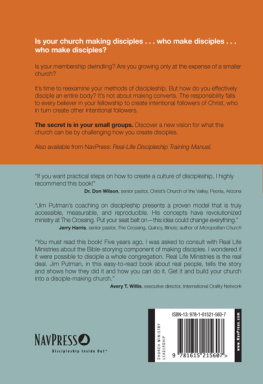
NavPress is the publishing ministry of The Navigators, an international Christian organization and leader in personal spiritual development. NavPress is committed to helping people grow spiritually and enjoy lives of meaning and hope through personal and group resources that are biblically rooted, culturally relevant, and highly practical.
For a free catalog go to www.NavPress.com
or call 1.800.366.7788 in the United States or 1.800.839.4769 in Canada.
2010 by William James Putman
All rights reserved. No part of this publication may be reproduced in any form without written permission from NavPress, P.O. Box 35001, Colorado Springs, CO 80935. www.navpress.com
NAVPRESS and the NAVPRESS logo are registered trademarks of NavPress. Absence of in connection with marks of NavPress or other parties does not indicate an absence of registration of those marks.
ISBN-13: 978-1-61521-560-7
Cover design by Studio Gearbox
Cover images by Getty, iStock, Photos.com, Veer, and Masterfile
Some of the anecdotal illustrations in this book are true to life and are included with the permission of the persons involved. All other illustrations are composites of real situations, and any resemblance to people living or dead is coincidental.
Unless otherwise identified, all Scripture quotations in this publication are taken from the Holy Bible, New International Version (NIV). Copyright 1973, 1978, 1984 by International Bible Society. Used by permission of Zondervan. All rights reserved. Other versions used include: the New American Standard Bible (NASB), Copyright 1960, 1962, 1963, 1968, 1971, 1972, 1973, 1975, 1977, 1995 by The Lockman Foundation. Used by permission; and the Holy Bible, English Standard Version (ESV), copyright 2001 by Crossway Bibles, a division of Good News Publishers. Used by permission. All rights reserved.
Library of Congress Cataloging-in-Publication Data
Putman, Jim, 1966
Real-life discipleship : building churches that make disciples / Jim Putman.
p. cm.
ISBN 978-1-61521-560-7
1. Discipling (Christianity) I. Title.
BV4520.P88 2010
253--dc22
2010014128
Printed in the United States of America
1 2 3 4 5 6 7 8 / 14 13 12 11 10
acknowledgments
To my parents, who taught me what discipleship looks like.
To my wife and children, who have journeyed with me through all my stages of growth spiritually and my lapses back to childhood.
To the Real Life family and team, God has brought us together for our part of the mission to be a spiritual family who enjoys the mission and journey together. What a ride and what a blessing.
introduction
I was in a grocery store the other day, and it happened again: an all-too-familiar discussion. Standing next to me in the dairy section was a man with a Bible college and seminary degree and years of ministry experience as a counselor. When I asked him where he was going to church, he answered, Nowhere really.
When I asked him why not, he said he was tired of the organized church. He was unconnected, searching, disillusioned. Like many I have talked with, this believer loved Jesus and the Word, but he had lost faith in what he called organized religion. He longed for relationships and purpose inside of a local body of believers who valued biblical theology, but he had lost faith that such a church was possible to find. Oh, he had started his ministry journey as so many believers do: idealistic, full of zeal and confidence. God was going to change the world through him and through the church he would help to lead.
Then he accepted a leadership position in a church.
There he found little intentionality and passion, mostly just people failing to get along. He saw hurting, lonely people in the congregation and in the staff especially the staff. He saw a semi-organized church that had become an internal political nightmare with little life inside its walls. Few came to know Jesus there.
What had made matters worse was that most of the people this counselor saw in his practice were Christians, many of them pastors. Most were a mess, yet on Sunday morning in public they acted as if things in their lives were great. But this man knew better. These same people had been in his office the week before. It all seemed wrong. He didnt expect Christians to be perfect, just real. Changed. He no longer wanted any part of a local church. He figured there had to be something else besides what the church had become. His solution was to become organic just get together with a few believing friends and shy away from anything that looked as if it had been planned or designed by men, as he said it.
But as I listened to him, I became convinced that he had made a mistake in his calculations. Granted, his assessment of the American evangelical church today was on target in many respects. There is often too little life in many of our churches. Christians do put on masks, hiding and pretending they are okay when they are not. They fight over the color of the carpet or their musical preferences. The ministry life of many churches is dominated by committee meetings and worship services and counseling sessions, but in many cases these produce little lasting fruit. Our churches make few converts. Few Christians have authentic, accountable relationships, and many are not growing in their faith. Few give, few serve in the church, and most live for the same things that nonbelievers do. When asked, most Christians say they dont experience God when they go to church. Godly leaders are getting harder and harder to find. I know of church planting organizations and congregations who have set aside the money to plant five new churches, but they cant find any qualified, capable leaders to plant the churches, so the money sits unused.
Sadly, we are making a mess of what God intended the church to be.
While many churches acknowledge that they are in trouble, they too frequently come up with the wrong solutions. Some are chasing fads. Others are asking how to modernize biblical words, worship services, or even our theology so it will be more to the liking of the potential consumers. I believe that in the end, all these solutions will only end up dooming the church to the steady decline it is already on. Dont get me wrong: I am not against using words that people can understand or having music that appeals to a younger crowd. However, whenever we stray from Gods Word, we will not have Gods blessing, and without that blessing, the forces of hell will prevail against the church (see Matthew 16:18). Jesus said that the gates of hell will not prevail against His church; He did not say any church. If the church is no longer His church, it has no protection from the Enemy. It cannot crash through the walls that protect the lost from the light. Walking away from the church is not an option either, particularly if we want to be a part of the Lords plan to rescue the world. The church is Gods idea, and we must seek to restore it to its purpose and blessing. Rather than swing the pendulum too far, lets get back to basics.
Although I can see the same problems my counselor friend sees, I believe he has misdiagnosed the cause of the problems. The problem is not organization. Why do I think he is wrong about this? Because as I look at Scripture, I see organization everywhere. For example, Jethro advised his son-in-law Moses to organize the Israelites into subgroups so that Moses would not work himself to death (see Exodus 18). In the New Testament, Paul lists administration as a specific gift given by the Holy Spirit so that there could be order in the church (see 1 Corinthians 12:28). An elders job was to make sure that the church body functioned in an orderly, God-glorifying way.















